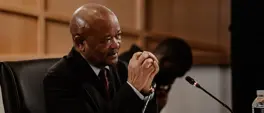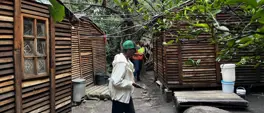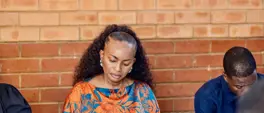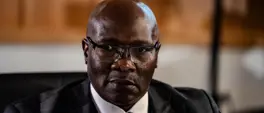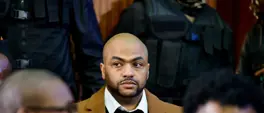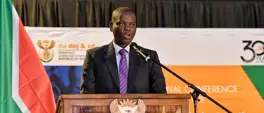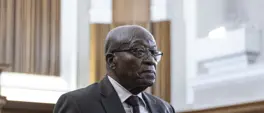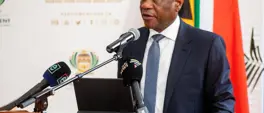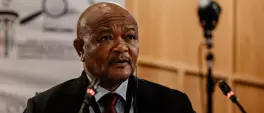MALAIKA MAHLATSI | Tshidi Madia’s candle burned out long before her legacy ever will
Malaika Mahlatsi
28 August 2025 | 8:08Following the passing of EWN's associate editor Tshidi Madia, Malaika Mahlatsi pays tribute to her 'big sister'.

EWN's Tshidi Madia.
"Malaika, I am adopting you as my little sister."
Those were the first words Tshidi Madia said to me, the very first time we met almost a decade ago.
Like millions of South Africans, I had immense respect for Tshidi's work and incisive commentary on the country's political economy. When she said those words to me, it felt like I was being affirmed - that someone of such great intellect deemed me worthy of being in her space, of being her little sister. I would discover, over the years, and with great admiration, that Tshidi was a big sister to many of us. She was intentional about being present for young Black women who, in her eyes, had a lot to offer the world and needed to be supported and protected in a world where we are so easily chewed and spit out.
A few years later, I would join Primedia Group as a columnist for EWN, and it was there that Tshidi's commitment to being my big sister was solidified. Nowhere was her protective nature more evident than when, after years of writing for the publication, a job that I do remotely, I decided one day to visit the Primedia offices in Sandton. Tshidi fetched me from the reception area and introduced me to colleagues, holding my hand as she marched me from one desk to another to meet former EWN Digital Editor, Nica Richards, Editorial Coordinator, Joan Nekhumbe, and several others with whom I had only ever communicated via email. "Here is our problem child, Malaika", she said affectionately as colleagues and I hugged and shook hands.
Afterwards, she insisted on taking me down to the cafeteria to have lunch, demanding to pay because "O ngoana, Malaika" (you're a child, Malaika). It wasn't said in a condescending way, and was not intended to be dismissive or infantilising. It was said in the Tshidi way - firmly, gently and protectively, as a reminder that she was my big sister.
There would be many moments when Tshidi showed up for me the way a big sister should. When I received my summons from the German police after being accused of "rewarding and supporting terrorism" for my support of the Palestinian cause, it was Tshidi and Sbu Ngalwa, the former Editor-in-Chief of EWN, whom I first informed. I was in a state of panic, worried that I would be hurled before the courts in a foreign country where I had relocated a few months prior, and where I had no support structure. Both Tshidi and Sbu gave me reassurance that they would stand by me and that they were a phone call away if I needed anything at all.
It was a commitment that they stuck to, and on many nights over the coming months, I would receivephone calls from Tshidi asking after my well-being. No matter how busy Tshidi was, she never ceased to be present when I needed her most.
But while Tshidi was protective and affectionate as a big sister, she was firm and uncompromising when it came to work. Over the years, I have worked as an in-house political commentator for EWN, analysing critical political events both nationally and internationally. These include local government and national government elections, national conferences of various political parties, the G20 summit in Rio de Janeiro and other events. During these moments, Tshidi and I would often sit down and debate extensively, our discussions often getting heated as we differed on perspectives. She was not intolerant of dissent - she was unwilling to accept arguments that were not grounded in intellectual rigour. Those who knew and worked with Tshidi will tell you that she was a stickler for well-researched arguments, regardless of what direction they took. It mattered to her that one presented arguments that had basis in fact.
The world got a front row seat to this when, just a few months ago, she mopped the floor with an ignorant American journalist, Leland Vittert, during an appearance n US network, News Station. At a time when many journalists and politicians were groveling at the feet of the Donald Trump regime, regurgitating his dangerously uninformed opinions and baseless conspiracy theories about the state of South Africa, Tshidi stood firm in speaking truth to power, insisting on a discussion rooted in facts.
Her commitment to the truth shone through in her passionate rebuttals to Vittert's falsehoods, and in that moment, the rest of the world learned what we South Africans already knew: that Tshidi Madia was not someone who could be railroaded or manipulated by powerful people. It is a lesson many politicians learned when they sat down to be interviewed by Tshidi.
That night, I called her, ecstatic about the way she had handled the interview and telling her how much praise she was receiving from millions of South Africans. With her usual disarming manner, she laughed heartily and responded: "Ka tla ka borwa ke motho ka maaka" (I was annoyed by the lies). We chatted for a few minutes before she abruptly told me she was hanging up because once we start talking, we wouldn' finish, and she needed to sleep. I hung up with a smile on my face, unconcerned because I knew we would have many more years to talk and laugh with each other. Those many years would be mere months.
The last time I spoke to Tshidi was just days before she was admitted to the hospital.
"Please have coffee with me,"she said. We agreed on a day and I was looking forward to it because we had so much to catch up on. That day never came. But even when I was informed of her hospitalisation, I never for a minute imagined that she would not make it. This was Tshidi - a fighter, someone about whom we would say in Soweto lingo: "She's not the dying type". She still had so much to live for. She was looking forward to the local government elections next year and was following political developments with curiosity. I, too, was looking forward to the elections, in great part because I would be working with her and Nisa Allie, the Editor-in-Chief of EWN who, like Tshidi, is protective of young women and has an endless capacity for compassion. That is the EWN family I have come to know and love over the years.
Today, as I sit in my house writing this article, referring to Tshidi in the past tense, I am reminded of just how fragile life is. We live on borrowed time and we only live once. But if we live as Tshidi did - with passion, integrity, honesty and curiosity - then once is enough.
Malaika Mahlatsi is a researcher and geographer at the Institute for Pan African Thought and Conversation. She is a PhD in Geography candidate at the University of Bayreuth in Germany.
Get the whole picture 💡
Take a look at the topic timeline for all related articles.
Trending News
More in Opinion

5 December 2025 04:47
MANDY WIENER: Madlanga Inquiry reveals war between 'Hopedealers' and 'The Corrupt'

2 December 2025 12:00
TEGAN SNYMAN | Gender-based violence and femicide need to be treated as a true national crisis
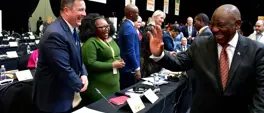
1 December 2025 13:55
JAMIL F. KHAN | GNU era exposes that corruption has no race and no party boundaries

